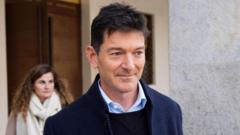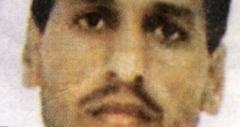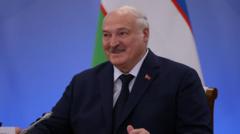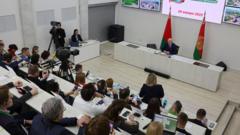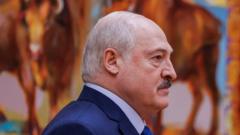In a statement reflecting the growing discontent from global leaders, the U.S. and allies have imposed sanctions, claiming violations of democracy and human rights under Maduro's regime.
**US Offers $25 Million Reward for Nicolás Maduro's Arrest Amid International Isolation**
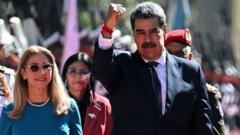
**US Offers $25 Million Reward for Nicolás Maduro's Arrest Amid International Isolation**
On the day Nicolás Maduro was inaugurated for a controversial third term, the U.S. has significantly escalated its actions against the Venezuelan president with a reward of $25 million.
The U.S. government has declared a staggering $25 million reward for information leading to the arrest of Nicolás Maduro as he was inaugurated for a third six-year term. The ceremony, however, found itself clouded by widespread condemnation from the international community and strong opposition from various Venezuelan leaders. Additionally, the U.S. offered rewards for the arrest of other key officials, including $15 million for Defence Minister Vladimir Padrino and rewards for Interior Minister Diosdado Cabello.
On the same day, the UK announced sanctions on 15 prominent Venezuelan officials, citing their roles in "undermining democracy, the rule of law, and human rights abuses." Foreign Secretary David Lammy criticized Maduro's administration as "fraudulent" in nature. Meanwhile, the European Union extended its "restrictive measures" citing ongoing issues obstructing democracy and a functional legal system in Venezuela, also sanctioning a further 15 officials.
Canada echoed these sentiments, laying down additional sanctions and emphasizing the government's failure to uphold democratic norms. Foreign Minister Mélanie Joly condemned Maduro’s actions, insisting on the importance of citizen rights and freedoms.
The $25 million reward from the U.S. stems largely from charges of narcotics trafficking and corruption since 2020, during which Maduro and other officials were accused of "narco-terrorism" aimed at destabilizing American society. Since then, the U.S. government has reintroduced oil sanctions, previously relaxed in hopes of encouraging free elections in Venezuela.
Maduro, in his inaugural address, made bold claims of entering a "new democracy" filled with "peace and prosperity." However, the results from the controversial elections held on July 28 faced severe criticism from many countries, including Brazil and Colombia, with the opposition and the U.S. backing exiled candidate Edmundo González as the legitimate president.
The inauguration itself was tightly monitored, with Venezuelan and foreign media restricted from attendance. Maduro's remaining support mainly comes from a few allies including Iran, China, and Russia, leaving him largely isolated. Only the heads of state from Cuba and Nicaragua were present at the ceremony.
Edmundo González, who fled Venezuela in September, is actively seeking to rally international support against Maduro. The Venezuelan government has retaliated with an arrest warrant for González, accompanied by a $100,000 reward for information leading to his capture.
The United Nations Secretary General, Antonio Guterres, has called for the release of individuals who have been "arbitrarily detained" since the elections, further highlighting the growing focus on human rights abuses in Venezuela.



